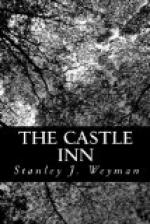CHAPTER XVI
THE BLACK FAN
I believe that Sir George, riding soberly to Estcombe in the morning, was not guiltless of looking back in spirit. Probably there are few men who, when the binding word has been said and the final step taken, do not feel a revulsion of mind, and for a moment question the wisdom of their choice. A more beautiful wife he could not wish; she was fair of face and faultless in shape, as beautiful as a Churchill or a Gunning. And in all honesty, and in spite of the undoubted advances she had made to him, he believed her to be good and virtuous. But her birth, her quality, or rather her lack of quality, her connections, these were things to cry him pause, to bid him reflect; until the thought—mean and unworthy, but not unnatural—that he was ruined, and what did it matter whom he wedded? came to him, and he touched his horse with the spur and cantered on by upland, down and clump, by Avebury, and Yatesbury, and Compton Bassett, until he came to his home.
Returning in the afternoon, sad at starting, but less sad with every added mile that separated him from the house to which he had bidden farewell in his heart—and which, much as he prized it now, he had not visited twice a year while it was his—it was another matter. He thought little of the future; of the past not at all. The present was sufficient for him. In an hour, in half an hour, in ten minutes, he would see her, would hold her hands in his, would hear her say that she loved him, would look unreproved into the depths of her proud eyes, would see them sink before his. Not a regret now for White’s! Or the gaming table! Or Mrs. Cornelys’ and Betty’s! Gone the blase insouciance of St. James’s. The whole man was set on his mistress. Ruined, he had naught but her to look forward to, and he hungered for her. He cantered through Avebury, six miles short of Marlborough, and saw not one house. Through West Kennet, where his shadow went long and thin before him; through Fyfield, where he well-nigh ran into a post-chaise, which seemed to be in as great a hurry to go west as he was to go east; under the Devil’s Den, and by Clatford cross-lanes, nor drew rein until—as the sun sank finally behind him, leaving the downs cold and grey—he came in sight of Manton Corner.
Then, that no look of shy happiness, no downward quiver of the maiden eyelids might be lost—for the morsel, now it was within his grasp, was one to linger over and dwell on—Sir George, his own eyes shining with eagerness, walked his horse forward, his gaze greedily seeking the flutter of her kerchief or the welcome of her hand. Would she be at the meeting of the roads—shrinking aside behind the bend, her eyes laughing to greet him? No, he saw as he drew nearer that she was not there. Then he knew where she would be; she would be waiting for him on the foot-bridge in the lane, fifty yards from the high-road, yet within sight of it. She would have her lover come so far—to win her. The subtlety was like her, and pleased him.




